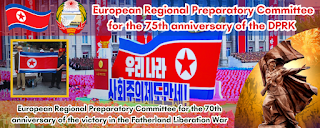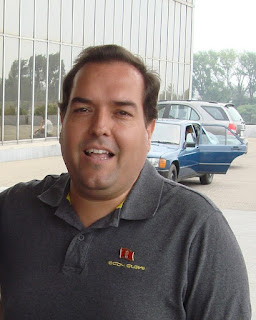75 YEARS OF VICTORIES AND GLORIES-Shaun Pickford -head of Staffordshire KFA UK branch and secretary general British Group for the Study of the Juche Idea.
Over the course of social-historical development, politics constituted one of the basic spheres of human activity. The role and influence of politics are immeasurably greater in a socialist society, where the working masses play the leading role. Having gained a deep insight into the decisive role political life has on society, the three Great Leaders of the Korean Revolution, Kim IL Sung, Kim Jong IL, and Kim Jong Un evolved theories on state power. The 75th anniversary of the founding of the Democratic People's Republic of Korea gives us the opportunity to reflect on the unique history and essence of state power in the DPRK.
An examination of the roots of the DPRK's foundation can be found in the revolutionary traditions of the Anti-Japanese National Liberation Struggle of the 1930s and 1940s. A People's Revolutionary Government was set up in the areas that had been freed from colonial rule along the Tumen River, between Manchuria and Korea. The programme of the Association For the Restoration of the Fatherland, which was issued on May 5th, 1936, called for the establishment of a People's Democratic Government after liberation. When Korea gained its freedom from Japanese Imperialism on August 15th, 1945, the process of building a new state structure began. A pressing question before the liberated Korean people was What kind of state power should be built? Kim IL Sung addressed this point on October 3rd, 1945, stating that Korea should take the road of progressive democracy. The concept of progressive democracy was more attuned to the conditions of Korea, which had emerged from feudalism and colonialism. In point of fact, neither Soviet-style proletarian democracy nor a US kind of bourgeois democracy would have been applicable to the needs of the Korean revolution at the time.
The first state power organ to be set up in Democratic Korea was the Provincial Peoples Committee of North Korea and this was replicated with Peoples Committees in the counties and provinces all over Korea. A 20-point platform was adopted by the PPCNK which led to the victory of the anti-imperialist, peoples democratic revolution in Korea. Radical reforms were carried out in the agrarian sector, major industries were nationalized, education became universal, women's rights were guaranteed and workers' rights were implemented by the PPCNK. The task was to formulate these achievements in state power. and Kim IL Sung proposed that an independent and sovereign state should be built in the shape of a Democratic People's Republic of Korea. On August 25th, 1948, the election of deputies to the Supreme Assembly, took place in all parts of north and south of Korea. In the northern half, where the election was held without incident, 99.97 per cent of voters participated and in the southern half, the election took place defying the suppression by the puppet regime, with 77.55 of voters casting their ballots. On the basis of the results of the north-south General Election, the 1st session of the Supreme Peoples Assembly was conveyed in Pyongyang on September 2nd, 1948 and was attended by 572 deputies. The Great Leader Comrade Kim IL Sung was elected the Premier of the Cabinet, the Head of State of the DPRK. On September 9th, 1948, the Democratic Peoples Republic of Korea was proclaimed to the world. With the establishment of the DPRK, the Korean people became a dignified people who would determine their fate independently. The Democratic Peoples Republic of Korea is the only authentic state in Korea, which commands the unanimous support of the entire people. The founding of the DPRK is an acknowledgment of its democratic and sovereign nature carrying forward the Anti-Japanese Revolutionary Traditions.
Political life in the DPRK is a universal one and a daily routine for every member of society. The DPRK gives the opportunity to the working people to exercise their leading role in the state power and participate actively in governmental administration. All citizens aged 17 years and over have the right to elect and to be elected irrespective of gender, occupation, party affiliation, and property status. There is the right to recall any deputy of the Supreme Peoples Assembly. All elections are universal and equal by secret ballot. The social composition of the deputies to the Supreme Peoples Assembly is as follows: 37 percent from the working class, 10 percent from the cooperative peasantry and 20 percent are women. In total, the number of deputies to the SPA is currently 687. To give one example of how socially inclusive the democratic process is in the DPRK, Jo Kil Nyo a Street Cleaner from the Phyongchan District, Pyongyang had been elected as a SPA Deputy. There are representatives from the Workers' Party of Korea, the Korean Social Democratic Party, the Chondoist Chongu Party, the General Federation of Trade Unions, and youth and women's groups who are deputies to the Supreme Peoples Assembly.
Under the guidance of Kim Jong Un, the state mechanism of the DPRK was updated and perfected. The State Affairs Commission of the Democratic Peoples Republic of Korea was instituted as the highest body of the state in June 2016 and streamlined the governmental system. In view of changing circumstances, the Socialist Constitution of the DPRK has been amended several times in the last 5 decades. The Respected Comrade Kim Jong Un is now the president of the State Affairs Commission of the DPRK.
As part of a delegation of the UK Korean Friendship Association, I had the privilege of seeing the vibrant reality of Socialist Korea on the occasion of the celebrations of the 70th anniversary of the founding of the Democratic Peoples Republic of Korea in September 2018. Always memorable was witnessing the parade on the Kim IL Sung Square in Central Pyongyang for the DPRK's foundation day and viewing the mass games "The Country of The People" staged in The May Day Stadium. Being in Pyongyang for the 70th-anniversary commemorations of the Republic was a living testimony to the socialist civilization of the DPRK. It can be said that the Democratic People's Republic of Korea is a society of the future already in the present, a model of Communism for all of humanity.
Reflecting on the 75th anniversary of the Republic, it can be regarded that the form of government in the Democratic People's Republic of Korea is the most democratic one corresponding to the aspirations of the popular masses and based on the united forces of the population. Democracy in a lot of countries around the world is a commodity that is bought and sold to the highest bidder and there is apathy and alienation among the ordinary citizens towards the electoral processes in those nations. In contrast, the decision-making process in the DPRK at all levels is actively taken part by the majority of the people. A genuine people's government that represents and safeguards the interests of the working people, including the workers, peasants, and intellectuals is operating in the DPRK. On the 75th anniversary of its foundation, the Democratic People's Republic of Korea is looking more magnificent and glorious as a great and independent socialist power.
GLORY TO THE 75TH ANNIVERSARY OF THE DEMOCRATIC PEOPLE'S REPUBLIC OF KOREA!
LONG LIVE THE DEMOCRATIC PEOPLE'S REPUBLIC OF KOREA, THE HOMELAND OF THE GREAT JUCHE AND SONGUN IDEAS!!
Shaun Pickford -head of Staffordshire KFA UK branch and secretary general British Group for the Study of the Juche Idea.


Comments